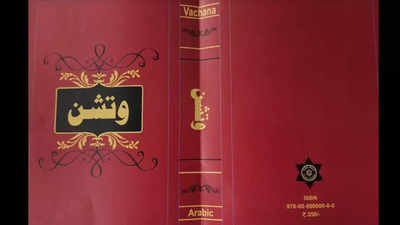- News
- City News
- hubballi News
- 12th century Kannada vachanas translated into Arabic
Trending
This story is from September 19, 2021
12th century Kannada vachanas translated into Arabic
Kannada vachanas (discourses) composed by Sharanas, followers of Lingayat saint-poet-philosopher Basaveshwara, have their own significance in the history of Indian literature.

The cover page of ‘Vachan’, an Arabic translation of 2,500 vachanas edited by MM Kalburgi
HUBBALLI: Kannada vachanas (discourses) composed by Sharanas, followers of Lingayat saint-poet-philosopher Basaveshwara, have their own significance in the history of Indian literature.
Now, more than 2,500 vachanas, edited by slain rationalist-scholar MM Kalburgi, have been translated into Arabic by scholars from Kashmir University and Jamia Millia Islamia.
The Bengaluru-based Basava Samithi has published ‘Vachan’ under its multilingual translation project launched in 2008 under the editorship of Kalburgi.
“Arabic is the first foreign language in which we are releasing this book comprising 2,500 vachanas authored by 173 Sharanas of the 12th century,” said Aravind Jatti, president of Basava Samithi.
Kalburgi, the scholar of Vachana literature, was shot dead outside his residence in Dharwad in August 2015 allegedly over his progressive views.
“The book, ‘Vachana’, has been published in 23 Indian languages and will soon be published in Persian, Angika, Dogri, Bajjika, Mandarin, French and Spanish. Kannada Vachana is the first in the history of Kannada literature to be translated in 31 languages. The Samiti hopes to translate it in 80 languages in the next five years.”
M Zaman Azurdah, retired professor of Kashmir University in Srinagar, who coordinated the Arabic translation of Vachanas, said: “Imagine, Lord Buddha left the throne and served the cause of justice, human rights and the rights of weaker sections. Immediately after that, we have vachanas composed, recited and propagated by men and women. Think of Basavana, the finance minister of his time, when the aristocratic attitude of those empowered, would violate all the natural and righteous responsibilities...he approached human beings in a very humane way,” said Azurdah. “Perhaps till then the rest of the world was less concerned with human behaviour when our saints in the form of vachanas pleaded for the rights of children, women and weaker sections. We are fortunate that late professor Kalburgi collected these,” he said.
Professor Shad Hussain of Kashmir University, editor of the translation, said he was first introduced to Lingayat philosophy by Azurdah. His team, including scholars of Jamia Millia Islamia university of Delhi, translated the discourses. “The vachanas are already available in English and Urdu. Shivasharanas from different walks of life have imparted the nectar of wisdom employing symbols of their respective professions. Many of the higher values of morality depicted in this profound Lingayat literature are attuned to the teachings of Islam,” he said.
Now, more than 2,500 vachanas, edited by slain rationalist-scholar MM Kalburgi, have been translated into Arabic by scholars from Kashmir University and Jamia Millia Islamia.
The Bengaluru-based Basava Samithi has published ‘Vachan’ under its multilingual translation project launched in 2008 under the editorship of Kalburgi.
“Arabic is the first foreign language in which we are releasing this book comprising 2,500 vachanas authored by 173 Sharanas of the 12th century,” said Aravind Jatti, president of Basava Samithi.
Samiti plans to translate Vachana into 80 languages
Kalburgi, the scholar of Vachana literature, was shot dead outside his residence in Dharwad in August 2015 allegedly over his progressive views.
“The book, ‘Vachana’, has been published in 23 Indian languages and will soon be published in Persian, Angika, Dogri, Bajjika, Mandarin, French and Spanish. Kannada Vachana is the first in the history of Kannada literature to be translated in 31 languages. The Samiti hopes to translate it in 80 languages in the next five years.”
M Zaman Azurdah, retired professor of Kashmir University in Srinagar, who coordinated the Arabic translation of Vachanas, said: “Imagine, Lord Buddha left the throne and served the cause of justice, human rights and the rights of weaker sections. Immediately after that, we have vachanas composed, recited and propagated by men and women. Think of Basavana, the finance minister of his time, when the aristocratic attitude of those empowered, would violate all the natural and righteous responsibilities...he approached human beings in a very humane way,” said Azurdah. “Perhaps till then the rest of the world was less concerned with human behaviour when our saints in the form of vachanas pleaded for the rights of children, women and weaker sections. We are fortunate that late professor Kalburgi collected these,” he said.
Professor Shad Hussain of Kashmir University, editor of the translation, said he was first introduced to Lingayat philosophy by Azurdah. His team, including scholars of Jamia Millia Islamia university of Delhi, translated the discourses. “The vachanas are already available in English and Urdu. Shivasharanas from different walks of life have imparted the nectar of wisdom employing symbols of their respective professions. Many of the higher values of morality depicted in this profound Lingayat literature are attuned to the teachings of Islam,” he said.
End of Article
FOLLOW US ON SOCIAL MEDIA










